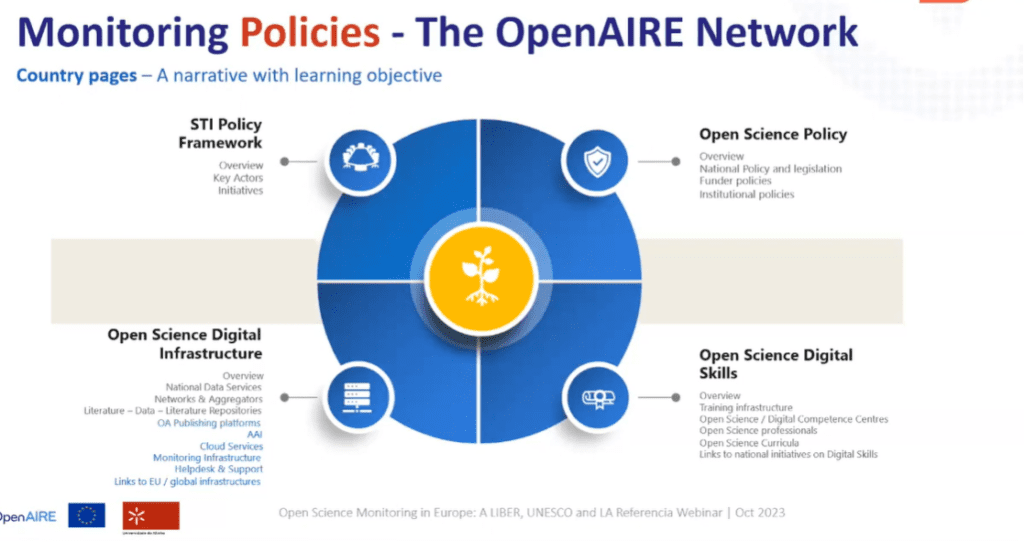LIBER, UNESCO and LA Referencia Webinar Report – Open Science Monitoring in Europe
On 3 October 2023 LIBER, UNESCO and LA Referencia joined forces for a webinar outlining the Open Science monitoring methods and tools currently developed in Europe. The event aimed to introduce several examples of inclusive monitoring of Open Science, in line with the 2021 UNESCO Recommendation on Open Science, to foster the uptake of monitoring frameworks that assess the outputs and impacts of Open Science practices.
The webinar heard from a wide range of speakers from various levels within the Open Science ecosystem.
Ana Persic (Programme Specialist for Science Technology and Innovation Policies and Open Science at the UNESCO Headquarters), began the discussion with an analysis of UNESCO’s efforts to create a global Open Science monitoring framework, with the UNESCO Recommendations on Open Science as a starting point. Ana emphasised the global importance of Open Science for academia and wider society, and how the UNESCO Recommendations aim to promote a common understanding of Open Science. Monitoring the uptake and impact of Open Science practices is a complex, muti-stakeholder process, and UNESCO have set up a Working Group to analyse how to create a global monitoring framework.
Look out for the UNESCO Open Science Outlook – a global and regional snapshot of status and trends in OS – coming soon.
Eloy Rodrigues (Director of the University of Minho Libraries in Portugal) discussed the OpenAIRE Open Science monitor. Assessing Open Science is a key part of the OpenAIRE Strategy, which they put into practice by accessing policies, practices, uptake and impact of Open Science activities. OpenAIRE is utlising a variety of tools and projects to measure Open Science practices, such as the OpenAIRE Monitor, the PathOS project, the Monitor Open Science Working Group and the Open Science Observatory.
Learn more about OpenAIRE’s work on Open Science monitoring in their 2023-2025 Strategy.

The second part of the webinar looked at two national approaches to Open Science monitoring; from France and Finland. Laëtitia Bracco (Project manager of the French Open Science Data and Software Code Monitor) discussed the process of creating and implementing the French Open Science Monitor, which tracks the number of Open Access publications, data sets, code and software released in France. Sami Niinimäki (Counsellor of Education, Ministry of Education and Culture in Finland) focused on efforts in Finland to monitor Open Science practices, which takes its framework from the Finnish Open Science and Research Declaration and supporting policies. Expert panels are brought together in Finland to develop indicators for OS monitoring, which is achieved through detailed surveys sent to universities and research institutes.
After a Q&A with an engaged audience led by Cecile Swiatek Cassafieres, LIBER President Julien Roche brought the webinar to a close with some concluding remarks about the current state of Open Science monitoring methods in Europe.
‘The challenge will be to articulate the different layers and initiatives of Open Science, so that, on one hand, local decision makers can build their strategy on tools and indicators tailored to their local needs, and on the other hand, everyone can rely on common definitions and tools, so that institutions and countries can compare and harmonise the effects of their OS policies in the lingua franca of OS.’ – LIBER President, Julien Roche
Access the speakers’ slides on Zenodo.
View the event recording in:
- Español: https://www.youtube.com/watch?v=1h4JLbfHxEs
- English: https://youtu.be/5M6S-7u4Tq4
Related Events